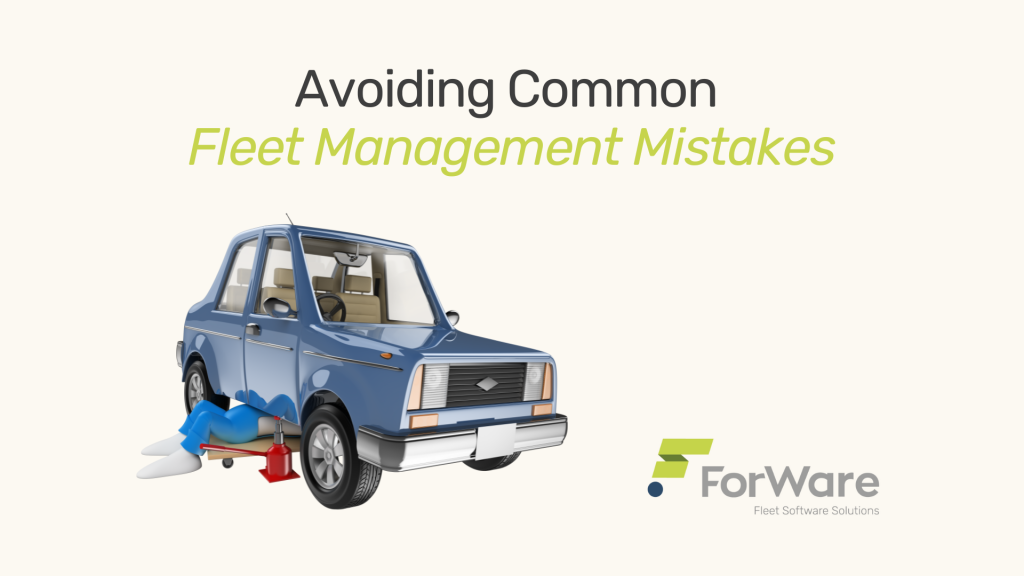Fleet Management is a complex role that affects virtually every area of your business, from Sales to Customer Service to Finance. Keep things running smoothly and you as a Fleet Manager might not be noticed, but you can be sure you’ll be the first in the firing line when things go wrong. While there are some common mistakes out there, the good news is they can be easily avoided with diligence and the right system in place. Let’s take a look at them.
Skipping a service
It seems obvious, but this is something that cannot be overstated when it comes to Fleet Management mistakes to avoid. Never skip a vehicle’s appointed service. This can be time interval-based or mileage-based, generally whichever occurs first. Yes, it may be an effort to get a driver to make their appointment, but this slight inconvenience is nothing compared to the trouble you can get into with an overdue service (or not having one at all). It will potentially void your warranty, but you’re also increasing the likelihood of significant problems that could easily be avoided. This leads to further expense and further downtime. Be smart. Don’t skip a service.
Skipping a VHC
‘It’s only a VHC; it’s not an actual service’. This is a big mistake for a Fleet Manager to make. While VHCs aren’t services, they are vital to picking up minor problems before they become big ones. Simple things like rotating the tyres will stop the front tyres from wearing out before the scheduled service. Aside from causing more vehicle downtime in ordering the tyres and arranging fitting, worn tyres are a contributory factor in as many one in 10 fatal crashes. And as if this wasn’t enough a neglected VHC could also void your warranty. Not something you want to explain to your boss, is it?
Using warranty as a crutch
Fleet Managers should make themselves familiar with their vehicle manufacturer’s Warranty Policy. This will vary from manufacturer to manufacturer and even within the vehicles themselves. For instance, a battery warranty may be different from that of the car’s warranty itself. As mentioned elsewhere in this article, you should familiarise yourself with the manufactured service and VHC intervals. Do not ignore either; they may well void your warranty, that expensive gearbox repair that you assumed was covered may suddenly be passed on to you simply because you were too late for a service at some point. Also, never make assumptions that the warranty will cover all parts. The clutch is a common issue; for many manufacturers, this is not viewed as a warrantable part but rather the wear could be viewed as being caused by improper driving style. This again highlights the importance of adequate driver training, which we will discuss next.
Failing to incorporate driver training as part of your Fleet Management Strategy
This can be an area that many Fleet Managers tend to overlook. It’s not so much an issue as to whether or not your drivers can drive, but rather, are they familiar with the type of vehicle? Or, have they any bad driving habits? Every car or van type is slightly different, even within the same make. How a driver has handled one vehicle type may not translate smoothly when it comes to handling a new type. The mishandling of a vehicle can reduce its optimum efficiency. At worst, mishandling a vehicle can even lead to an accident. When introducing a new type of car or van to your fleet, ensure every driver is familiar with it before letting them loose on the road. Likewise, look out for bad driver habits; perhaps some are particularly heavy on the clutch. This is something you’ll need to make them aware of; as mentioned earlier, manufacturers will often reject clutches when it comes to warranty claims as this is viewed as a driving style issue. Improper clutch use can damage the gearbox, a cost you’ll want to avoid. Another example of poor driving style affecting fleet efficiency is fuel usage; imagine you have 10 drivers driving similar terrain in the same type of car, and one of them always seems to go through more fuel than the others? You might need to review how they’re handling the vehicle.
Inadequate record-keeping
Good record-keeping is essential to smooth Fleet Management. It can affect everything from the proper scheduling of services to following up on expenses after work is completed. For example, you must plan your vehicle services well in advance; this will help you ensure that a courtesy car is in place, that the driver can make arrangements to drop into the service agent, and even what type of service the vehicle needs in the first place. All this data should be ready to hand. A Fleet Maintenance system such as ForWare makes this easy; at a touch of a button, you can bring up details as to what service is due next, when it is due, customer contact info, and other important information.
Similarly, after work is carried out, it’s crucial to record what work was carried out and when. Not only will this make scheduling future work with a garage much easier, but it will also help you make informed decisions when it comes to deciding on future repair work that crops up (they say the vehicle needs new tyres, but your records say they were only replaced 10k ago. This will also help when you need to review invoices with Accounts or when your managers are querying costs.
Using the wrong type of vehicle
There’s no ‘one size fits all’ vehicle for fleets. Fleet Managers should undertake research when it comes to fleet procurement or renewal. For instance, when managing a van fleet you must factor in the kinds of loads your fleet will be expected to carry. This will not only affect the size and cargo capacity of the van but also the engine type, and it may be the case that the fuel source makes a difference. With a fleet of cars, you should factor in the number of passengers the vehicles will carry. You may find different drivers have different needs, so you may need to include a few options or variants within your fleet. Driver journeys are also important to consider, as the average journey length. We all know DPFs don’t like short journeys and this should have a bearing on what vehicle is the most efficient, etc. It’s also important to look at the performance of your existing fleet when renewal time comes; if a previous vehicle type constantly gave troubles, it would make sense to consider alternative options when it comes to replacing it, rather than simply swapping like for like. As mentioned earlier, good record-keeping will help you make informed decisions when it comes to reviewing your current fleet’s pitfalls.



